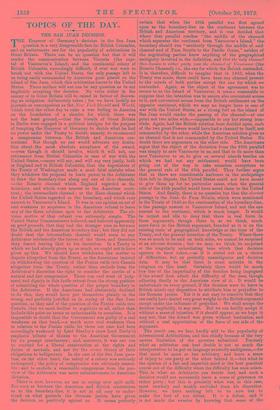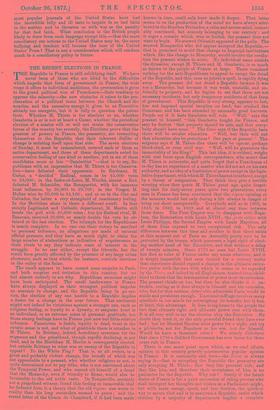TOPICS OF THE DAY.
THE SAN JUAN DECISION.
rrHE Emperor of Germany's decision in the San Juan 1 question is a very disagreeable fact for British Columbia, and an unfortunate one for the popularity of arbitrations in Great Britain. There can be no question but that it will render the communication between Victoria (the capi- tal of Vancouver's Island) and the continental colony of British Columbia exceedingly difficult, if ever war were to break out with the United States, the only passage left to us being easily commanded by American guns placed on the island of San Juan, which this arbitration leaves to the United States. There neither will nor can be any question as to our implicitly accepting the decision. No voice either in the colony or in Great Britain will be raised in favour of disown- ing an obligation deliberately taken ; for we have luckily no journals so unscrupulous as the New York Herald and World, which tried the other day to raise a war feeling in America on the foundation of a slander for which there was not the least ground,—that the friends of Great Britain in Berlin were engaged in a political intrigue for the purpose of tempting the Emperor of Germany to decide what he had no power under the Treaty to decide, namely, to recommend a compromise between the British and American con- tentions. But though no one would advocate any hesita- tion about the most absolute acceptance of the award, —even though it should involve, which it will not, our retirement from British Columbia in case of war with the United States,—many will say, and will say very justly, both in England and in British Columbia, that the negotiators of the Treaty of Washington made a most fatal mistake when they withdrew the proposal to leave power to the Arbitrator to draw the boundary-line along any one of three channels, —the Rosario channel which England regarded as the boundary, and which runs nearest to the American conti- nent • the intermediate channel ; or the Haro channel which the United States regarded as the boundary, and which runs nearest to Vancouver's Island. It was in our opinion an act of real weakness to acquiesce in the American refusal to leave any of the three solutions open to the Arbitrator. The ob- vious motive of that refusal was extremely simple. The United States' Commissioners believed, and believed apparently on good grounds, that they had the stronger case as between the British and the American boundary-line • but they did not doubt that the intermediate channel would seem to any Arbitrator intrinsically the fairest of the three, and therefore they feared leaving that to his discretion. In a Treaty in which we had already given up so much, we ought not to have given up this. We should have withdrawn the matter in dispute altogether from the Treaty, as the Americans insisted on withdrawing the question of the Fenian raids into Canada altogether from the Treaty., rather than exclude from the Arbitrator's discretion the right to consider the merits of a natural and fair compromise. There was real want of judg- ment and dignity in this facile retreat from the strong position of submitting the whole question of the proper boundary to the Arbitrator. If the Americans had obstinately declined to do this, they would have put themselves plainly in the wrong, and perfectly justified us in saying of the San Juan question, as they said of the question of the Fenian raids into Canada, that we must decline to negotiate at all, rather than include this point on terms so unfavourable to ourselves. It is impossible to doubt that the Government was guilty of a real weakness on that head,—a much more real weakness than in relation to the Fenian raids, for there our case had been exceedingly weakened by Lord Stanley's (now Lord Derby's) emphatic tribute of thanks to the American Government for its prompt interference ; and, moreover, it was our cue to contend for a liberal construction of the rights and duties of neutrals, and not far the severe theory of their obligations to belligerents. In the case of the San Juan ques- tion, on the other hand, the safety of a colony was seriously endangered ; the policy of compromise was obviously reason- ble ; and to exclude a reasonable compromise from the pur- view of the Arbitrator was mere submissiveness to American dictation.
There is now, however, no use in crying over spilt milk. But even as between the American and British contentions as to the boundary-line, it is not at all easy to under- stand on what grounds the German jurists have given the decision so positively against us. It seems perfectly
certain that when the 49th parallel was first agreed upon as the boundary-line on the continent between the- British and American territory, and it was decided that where that parallel reaches "the middle of the channel which separates the continent from Vancouver's Island," the. boundary should run "southerly through the middle of said channel and of Fuca Straits to the Pacific Ocean," neither of the negotiating parties knew anything of the geographical ambiguity involved in the definition, and that the only channel then known to either party was the channel of Vancouver (the- Rosario Channel), i.e., the one for which the British contended. It is, therefore, difficult to imagine that in 1846, when the Treaty was made, there could have been any channel present to the minds of both parties except the one for which we contended. Again, as the object of the agreement was to. secure to us the Island of Vancouver, it seems reasonable to suppose that the intention was to secure also convenient access
to it, and convenient access from the British settlement on the opposite continent, which we may no longer have in case of war with the United States, as a strong fort on the island of San Juan would render the passing of the channel—at one point not two miles wide,—impossible to any but strong iron- dads. Again, had the British solution been decided upon, each of the two great Powers would have had a channel to itself, not commanded by the other, while the American solution gives us no channel that is not commanded by the United States. No. doubt there are arguments on the other side. The Americana argue that the object of the deviation from the 49th parallel
was simply to save Vancouver to 11B, and that to do more than save Vancouver to us, to give us several islands besides on- which we had not any settlement, would have been- going out of the way to take causeless exceptions to the general rule of the 49th parallel. They further argue that as there are considerable harbours in the archipelago. thus left in dispute, the United States could not have meant to give them up for no particular cause, when the general rule of the 49th parallel would have saved them to the United States. And finally, there is no question but that the shortest passage to the Juan de Fuca Straits, which were mentioned in the Treaty of 1846 as the continuation of the boundary-line, is the passage nearest to Vancouver Island, and not the one nearest to the continent, which is much longer. It would be unjust and idle to deny that there is real force in, these arguments, though there is, as we think, much more force in the British argument, founded as it is on the- existing state of geographical knowledge at the time of the Treaty, and the general intention of the Treaty. Where there was so much to be said on both sides, we cannot be surprised at an adverse decision ; but we may, we think, be surprised at the singularly unhesitating tone which that decision appears to have taken,—as if it rested not on a choice of difficulties, but on perfectly unambiguous and decisive data. It may be that there is some mistake in the telegram on this head. Certainly there would be much. less fear of the impartiality of the decision being impugned if the award does admit the difficulty of the case, though adhering finally to the American view of it. It would be unfortunate on every ground, if the decision were to leave in. British minds any disposition to attribute bias or prejudice to the German jurists. Yet it is not easy to conceive that they can really have denied very great weight to the British argument except under the influence of prejudice. We shall accept the decision implicitly, in any case. But we can hardly accept it without a sense of injustice, if it should appear, as we hope it may not, that the Award was given without hesitation, and without a real appreciation of the force of our side of the argument.
The result can, we fear, hardly add to the popularity of international Arbitrations, and this chiefly because of the very unwise limitation of the question submitted. Precisely what an arbitrator can best decide is not so much the interpretation to be put on language avowedly ambiguous,—for that must be more or less arbitrary, and leave a sense of injury to one party or the other behind it,—but what in the opinion of a fair and impartial mind is the best practical course out of the difficulty when the difficulty has once arisen. This is what an Arbitrator can decide beat, and such a decision would not necessarily leave a sense of grievance on either party ; but this is precisely what was, in this case, most unwisely and weakly excluded from his discretion. However, we have nothing left to us now but to make the best of our defeat. It is a defeat, and it is not made the sweeter by knowing that some of the
most popular journals of the United States have had known in time, could only have made it deeper. That letter the incredible folly and ill taste to impute to us bad faith seems to us the production of the mind we have always attri- in the matter, and to threaten us with war as the penalty buted to the Bourbon Pretender, a calm and serene mind, immut- for that bad faith. What conclusion is the British people ably convinced, but scarcely belonging to our century ; and likely to draw from such language except this,—that the more it urges a crusade which, wise or foolish, the peasant does not conciliatory our actions to the United States may be, the more want to begin. No avowed Orleanist appeared at the polls. The bullying and insolent will become the tone of the United avowed Bonapartist who did appear accepted the Republic,— States' Press I That is not a consideration which will conduce that is, promised to avoid that change to Imperial institutions



































 Previous page
Previous page